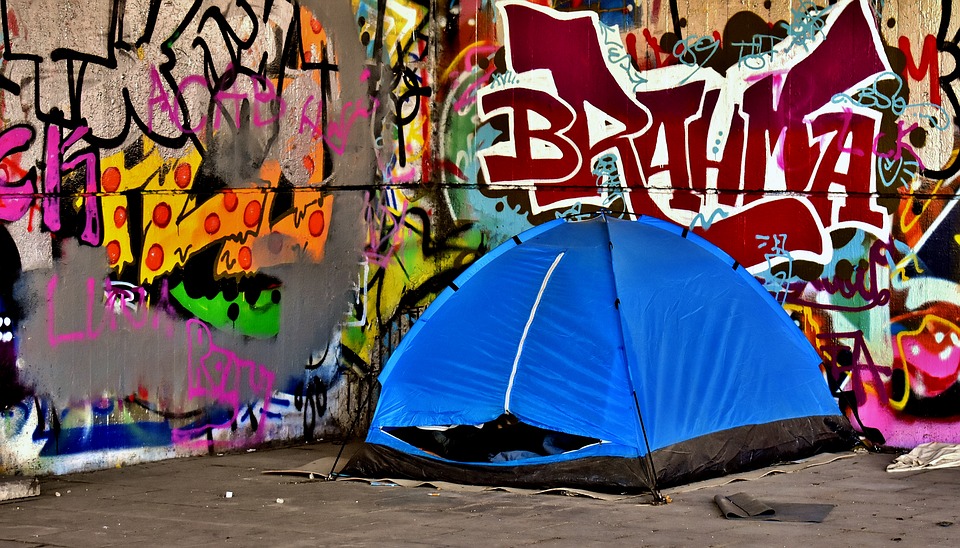LOS ANGELES, CA – Amid the increasing Homeless crisis in California, Trump has promised to do “something” about it during his visit to the West Coast this week. Although he didn’t mention any specifics, the LA Mayor has already stated that he is willing to cooperate with the Trump administration to solve this issue that affects us all.
THE ISSUE
The last couple of years have been hard for the housing situation in California. San Francisco has never had such levels of people living in the streets, some even with incomes and steady jobs. The Bay has always been considered one of the areas in the United States with higher rents, if not the most. But in the last few years, and partially because of the influence of the Silicon Valley monopoly in the area, the housing crisis has peaked.
Between 2018 and 2019, the Greater Los Angeles Homeless Count noted the number of people living in the streets increased by 12% in the whole county and by 16% just in the city.
LA’s skid row is a perfect example of the phenomenon. Lines of tents fill the streets around some of the biggest shelters in the city. Another area of homeless concentration is Koreatown. As of today, there are more than 60,000 people living on the streets in Los Angeles County.
One of the biggest misconceptions about homelessness is that it only happens to people with drug and self-destructive habits or to those who suffer from mental illness. But the actual reality of the housing crisis is that it can happen to anyone.
Mike Dickerson, who works for Ktown for All, a homeless advocacy group, talked about some of the most surprising stories he knew of homeless cases.
“I think a lot of people have this perception that danger lurks in the encampments,” he said.
“And for myself and for other volunteers, what we found is people who are just people like everyone else, who have fallen into hard times, whether that’s because of their own personal issues or because their landlord evicted them or because the rent rose in a way they could no longer pay.”
Shawn Pleasants, 52, is a perfect example of this.
SHAWN’S STORY
Shawn Pleasants has an impressive resume. A San Antonio native, he was high school valedictorian and went on to major in economics from Yale University with a scholarship. After succeeding in many banking jobs at Wall Street, he became a small business entrepreneur.
He gathered success with a filmmaking company that he co-founded in California chasing a Hollywood dream. They focused on the adult film industry during the ’90s, when the DVD industry was about to explode. He made enough money to buy a large and luxurious home in Silver Lake, LA.
But a few wrong turns in life 10 years ago left him homeless. After having some differences with his co-founders, losing his mother to cancer and becoming addicted to painkillers after sustaining a back injury, he lost everything he had.
Today he lives in the streets of Koreatown with a tarp as his sole refuge.
“I am responsible for my own choices. I own all my decisions,” he said.
He admits many people have told him before that a person like him, hard-working, well-formed and capable, should not be in this situation.
“But I’m like, should anybody be here? Who should, then?” he asks.
HIS LIFE IN THE STREETS
Pleasants is gay and has shared his life with another homeless man for the last 10 years. They met before being homeless and now they live in the streets together. In fact, they have lived in the same street for the last six years, but they are thinking about changing locations soon.
When asked about shelters, his opinion is simple and straight. “They’re always set up with such rigid protocols. I would leave the place immediately.” He says he hates the restriction of his freedom and feels like he would need to get rid of all his things due to the lack of available space.
“I would prefer to be somewhere where I can still go to the library and do the things I need to do when I need to do them.”
Shawn owns a cell phone and a laptop and frequents the library, where he spends long hours reading the news online and keeping himself up to date with worldwide events. His phone plan is free under a program released by the Obama administration.
He says he knows the schedules of certain churches and some food pantries so he can effectively get free meals to get by.
Although his remaining family has insisted several times on helping him, he is defiant. “I am not trying to bring another family member down,” he said. “I fell into it. I have to climb my way out of it.”
HIS VIEWS ON THE HOMELESS CRISIS
He believes the fact that he has the background he does, should not come as a shock.
“I think people point to things like mental illness or like drug abuse, which do exist in this population, but they aren’t the primary problem,” he said pointing to a close tent, “You’ll find musicians, there’s a photographer, you’ve got all different types of people.”
Shawn does not believe that Trump’s proposal of moving homeless people to a governmental facility is the best solution. “That’s not going to connect people to jobs, to housing, to services.”
He thinks the best approach is to give homeless people a long-term chance to end their string of bad choices and bad luck. He mentioned, for instance, the huge need for bathing facilities. These would allow people who live in the streets to shower and clean up. Hence solving many hygiene issues.
“And in order to get a job, we need to have clean clothes. Where do I iron? How do I keep them pressed?”, he also noted.
When asked about his future, Shawn flashed a confident smile. “I’m gonna start a small business again,” he said.








